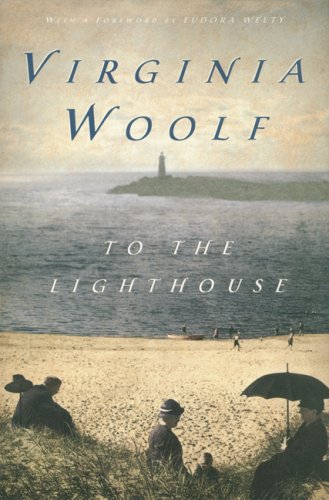“The
gruff murmur, irregularly broken by the taking out of pipes and the putting in
of pipes which had kept on assuring her, though she could not hear what was
said (as she sat in the window which opened on the terrace), that the men were
happily talking; this sound, which had lasted now half an hour and had taken
its place soothingly in the scale of sounds pressing on top of her, such as the
tap of balls upon bats, the sharp, sudden bark now and then, “How’s that? How’s
that?” of the children playing cricket, had ceased; so that the monotonous fall
of the waves on the beach, which for the most part beat a measured and soothing
tattoo to her thoughts and seemed consolingly to repeat over and over again as
she sat with the children the words of some old cradle song, murmured by
nature, “I am guarding you–I am your support,” but at other times suddenly and
unexpectedly, especially when her mind raised itself slightly from the task
actually in hand, had no such kindly meaning, but like a ghostly roll of drums remorselessly
beat the measure of life, made one think of the destruction of the island and
its engulfment in the sea, and warned her whose day had slipped past in one
quick doing after another that it was all ephemeral as a rainbow–this sound
which had been obscured and concealed under the other sounds suddenly thundered
hollow in her ears and made her look up with an impulse of terror.”
To the ligthouse
Virginia Wolf
Hogarth Press, 1927
traducido ao galego por Manuela Palacios e Xabier Castro,
To the ligthouse
Virginia Wolf
Hogarth Press, 1927
traducido ao galego por Manuela Palacios e Xabier Castro,
e publicada como
Cara ó faro
Santiago de Compostela: Editorial Sotelo Blanco, 1993
Cara ó faro
Santiago de Compostela: Editorial Sotelo Blanco, 1993
O murmurio fusco, entrecortado
polo mete e saca das pipas, víñalle asegurando, aínda que non podía distinguir
todo o que se dicía (xa que estaba sentada a carón da ventá), que os homes
falaban despreocupados; este murmurio, que duraba desde había media hora e
ocupaba un posto livián na escala de sons que penduraban a súa carga sobre ela,
tal coma os golpes das pelotas nos bates, o berro illado, repentino e agudo,
“¿Cómo vai?¿Como vai?”, dos nenos que xogaban ó críquet, cesara; de xeito que o
monótono bater das ondas na praia, que case sempre compasaba de maneira rítmica
e tranquilizadora os seus pensamentos e semellaba confortala repetindo unha e
outra vez, mentres estaba sentada cos seus fillos, as palabras dunha vella
canción de berce cantaruxada pola naturaza: “Estou a coidar de ti, son o teu
amparo”, pero outras veces, de xeito súpeto e inagardado, especialmente cando a
súa mente se afastaba un pouco da tarefa que tiña entre as mans, non amosaba un
significado tan agarimoso, senón que, coma o redobre arcano de tambores,
sinalaba sen compaixón a duración da vida, facía pensar na destrucción da illa,
afundida no mar, e a advertía, a ela para quen os días pasan bulindo, ás presas
dun feito a outro, que todo era efémero coma o arco da vella: este son que
estivera agochado e encuberto polos outros ruídos de súpeto estourou nos seus
oídos e fixo que erguese a mirada cun impulso de arrepío.



Ningún comentario:
Publicar un comentario